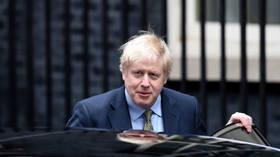This Covid-19 sermon on the BBC was biased, patronising & insufferable virtue signalling – we shouldn’t be forced to pay for it
9 Apr, 2020 18:31
Newsnight presenter Emily Maitlis delivered a monologue on inequality in the time of coronavirus and openly criticised a government minister. This is not her job and just shows why the licence fee should be canned.
Emily Maitlis delivered a monologue to the British people on Wednesday night. The Newsnight presenter kicked off the show by staring straight down the camera and giving a heartfelt speech on the impact of coronavirus. The BBC presenter blasted the notion that Covid-19 was a “great leveller” saying that it was a “myth that needs debunking.” She reminded the viewing public that “those on the front line right now” are “are disproportionately the lowest paid members of our workforce” and pointed out that people in tower blocks will find the lockdown tougher.
ALSO ON RT.COMThe working class should be hailed as Covid-19 heroes for enabling all our comfy quarantines
Not content with stating the blindingly obvious fact that lower paid people will find the current situation harder, she also made sure to take a pop at Dominic Raab for describing Boris Johnson, currently in intensive care, as a “fighter.” Dr Maitlis informed her adoring patients that “You do not survive the illness through fortitude and strength of character, whatever the prime minister’s colleagues will tell us.” Thanks for clearing that one up.
This is the BBC at its patrician, middle class, bien-pensant, virtue-signalling worst. Everything Maitlis said may well be factually accurate, yes life will be harder for poorer people during the lockdown, but life is harder for people with less money anyway; and obviously strength of character has far less of an impact on how well you recover from disease than the strength of your immune system. But the little people don’t need to be lectured to about those facts, least of all by someone whose exorbitant £260,000 ($324,000) salary (£100k more than the prime minister earns) those little people are forced to pay for on pain of prosecution.
This lecture came from a woman who lives with her investment manager husband in Kensington, not just London’s richest borough, but the country's. She is chums with the likes of actress Emma Thomson and TV presenter Piers Morgan, enjoys drinking Dirty Martinis at swish West End bars, has “chilli flake” facials administered by her “Persian beautician called Sima,” and has written a book about TV news called ‘Airhead’. Of course she understands the real world.
It was a small wonder that Maitlis was praised to the hilt from all the expected corners of Twitter. The same corner that suddenly decided that describing Boris Johnson as a “fighter” while he is battling coronavirus was offensive to people who’d died from Covid-19, despite every cancer patient for years being said to be “battling” the disease. Her intervention was said to have been “extraordinary,” “important” and “powerful” amongst other predictable platitudes. However, statements of this kind are unequivocally not the kind BBC presenters should be expounding, least of all in their professional capacity.
The BBC’s most sacred supposed virtue is its impartiality. They are intended to interrogate the government and opposition with neither fear nor favour, not tell us what they think. The presenter’s own opinions should remain a mystery to the viewers, not rammed down their throats like some kind of late-night secular sermon, however banal and predictable they may be. They certainly shouldn’t be attempting to sow seeds of division in the public at a time of national crisis, nor should a presenter be criticising the government off their own bat.
People describing coronavirus as a “great leveller,” are not saying that the financial impact of the lockdown is affecting all levels of society equally. Rather they are saying that you can fall victim to the dreaded virus literally whether you are a prince or a pauper. In the same way, to suggest that Dominic Raab, in saying, “if there’s one thing I know about this prime minister, he’s a fighter,” was in any way implying that people who had died of Covid-19 hadn’t fought hard enough is wilfully disingenuous. Raab was trying to reassure the public and express support for his friend and colleague by using a simile so well worn a more accurate criticism would be that it is hackneyed.
ALSO ON RT.COMBBC vandalizes literary classics with woke rewriting supposed to make it more ‘yoof’ friendly as it faces licence-funding crisis
The BBC does not like this government. It didn’t before the pandemic struck and there is little chance their response to it will do anything to change the opinions of the inhabitants of New Broadcasting House. This is because, back in the mists of time before coronavirus totally consumed the news agenda, Boris Johnson had suggested he may decriminalise non-payment of the licence fee. Since then, it has been pretty much open season between the Tory party and the BBC, with cabinet ministers boycotting some programmes just one example. Bizarrely, since one of the criticisms the government has of the BBC is its soft left bias, the corporation has if anything chosen to make this even more apparent, even as the pandemic heads towards its peak.
A common argument in favour of the BBC is that it prevents us having a Fox News- or MSNBC-style partisan channel that blurs opinion with comment. But monologues like Maitlis’s last night are straight out of the Tucker Carlson and Chris Matthews playbook. The BBC has no right to lecture the nation on inequality while simultaneously levying a poll tax on the public to fund their well-heeled presenters' absurdly comfortable existence. If they want to give us their opinions, they can give us back our money.
The statements, views and opinions expressed in this column are solely those of the author and do not necessarily represent those of RT.


0 Comments:
Post a Comment
Subscribe to Post Comments [Atom]
<< Home